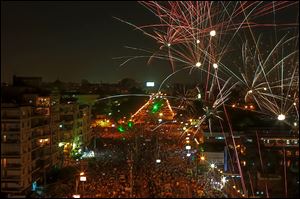
Interim Egypt leader names 3 from military to posts
Move raises questions about representation in government
7/7/2013
Fireworks burst overhead as opponents of Moham-med Morsi rally outside the presidential palace in Cairo on Sunday. It was the eighth straight day of gigantic demonstrations in the city.
CAIRO — Transitional Egyptian President Adly Mansour, named by the military to lead the country after it removed Mohammed Morsi from office, announced several key appointments Sunday, all of whom were members of the military or supporters of the nation when it was guided by the armed forces.
The development raised questions about whether Mr. Mansour’s government would, as promised, represent a broad spectrum of Egypt’s political factions or become a vehicle for control by the military.
Of the six appointees announced by Mr. Mansour, three were from the military.
The others were known for having never spoken out against the armed forces or the Supreme Council of the Armed Forces when it was in control of the government for 18 months after the fall of Hosni Mubarak in 2011.
Meanwhile, prominent supporters of Mr. Morsi remain in military custody, while members of the so-called youth movements that were instrumental in organizing the protests that led to Mubarak’s fall 2½ years ago said they have not been consulted in the formation of Mr. Mansour’s government.
There also were fresh reports about what role Mohammed ElBaradei, the former head of the International Atomic Energy Agency who leads a large political bloc that had opposed Mr. Morsi, would have in the new government.
Mr. ElBaradei’s appointment as prime minister was withdrawn after drawing opposition by the conservative religious el-Nour party.
There were reports he might now be named vice president as soon as today. If that appointment takes place, he would be the first person named to the government who had openly criticized military rule.
On Sunday, for the eighth straight day, Cairo was again the scene of huge demonstrations.
Tens of thousands of people rallied in Liberation Square and in front of the Ministry of Defense in support of the military’s toppling of Mr. Morsi last Wednesday. Some chanted slogans criticizing the United States for its perceived backing of Mr. Morsi.
Morsi backers held large counter-protests, primarily in Cairo’s eastern Rabaa district, calling for Mr. Morsi’s reinstatement.
There were no reports of violence in Cairo, but the military and Islamists clashed again in the Sinai, near the border with Israel, and there were signs of sectarian tensions as a Muslim man killed four Coptic Christians in the southern resort town of Luxor.
On Friday, at least 30 people were killed and more than 1,000 injured in pitched battles between pro and anti-Morsi crowds.